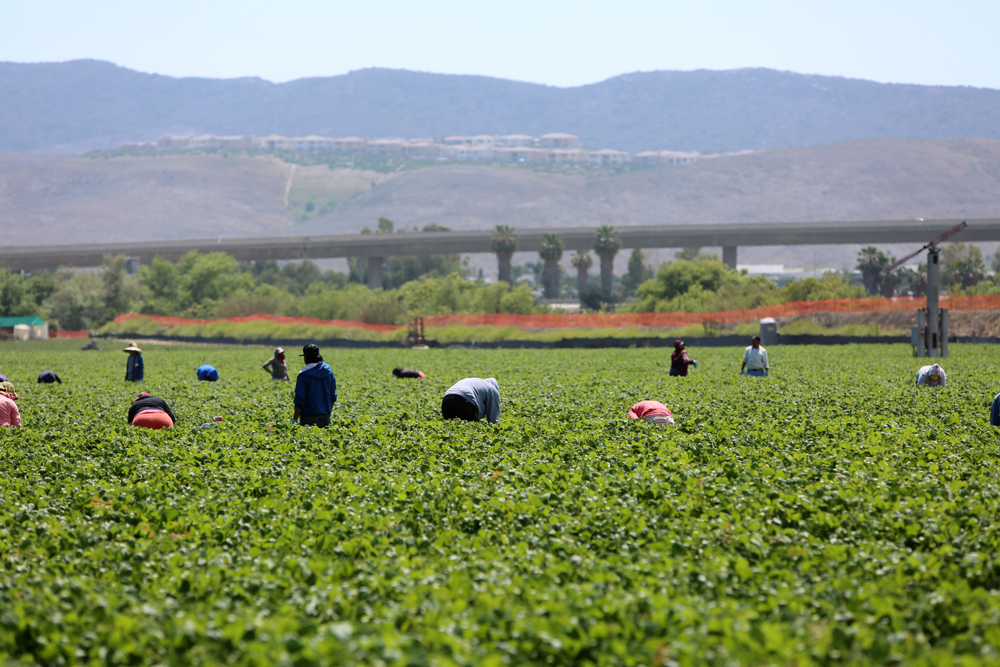The proposed law would also force farm employers to pay overtime wages to undocumented farmworkers.

President Joe Biden announced, on his first day in office, his intention to revamp the US’s immigration policy.
The first version of a massive omnibus bill, called the US Citizenship Act of 2021, was officially introduced into Congress this week by Senator Bob Menendez of New Jersey and Representative Linda Sánchez of California. Given that somewhere over a million (getting specific numbers is tricky) of America’s farmworkers are undocumented, this is also a major issue for agriculture. So, what’s in the bill?
The biggest part of the proposal concerns a path to citizenship for basically all undocumented people in the United States. Provided they pass a background check and pay taxes, all undocumented people in the country will have the option of getting onto a track to citizenship: five years of following these rules and paying taxes, then the standard green card process.
“Congress should pass this bill immediately,” said Bruce Goldstein, president of the advocacy group Farmworker Justice, in a press release. Farmworker Justice notes that the proposed bill includes many elements of the Fairness for Farm Workers Act of 2019, which was an attempt to fix some of the labor laws related to farmworkers. One major inclusion: Farm employers would be forced to pay overtime wages to farmworkers, a longstanding exclusion from an important labor protection. With the new pathway to citizenship that this bill proposes, undocumented farmworkers could gain legal status that would remove the fear of deportation that often inhibits them from enforcing labor rights.
Undocumented farmworkers have some specific regulations in the proposed bill; many are not permanently in the United States, so farmworkers instead have rules incorporating hours worked in the country. If undocumented farmworkers can prove that, in the past five years, they have worked for 2,300 hours or 400 days of agricultural work, they’d be eligible to apply for a green card immediately. The bill also makes it easier for the partners and families of undocumented workers to gain citizenship.
Perhaps most importantly, hiring undocumented workers is illegal, which means that employers aren’t terribly concerned about labor violations. Working conditions for undocumented workers are notoriously awful. Getting those undocumented workers a legal status in the country also confers upon them all the protections that they’d been lacking, including protection from unfairly low wages, safety gear, access to health care and a limit on hours worked.
A major refocus of the immigration system comes with a vastly decreased emphasis on border patrols and security; instead, funding is specifically focused at easing the often-dangerous transition from undocumented to legal resident, by cracking down on coyotes and other human smugglers.
Republican lawmakers have signaled that they will not support the bill in its current form, suggesting that it encourages illegal immigration (it does not; it simply makes legal immigration easier, including for those who already live in the country) and that it will take jobs away from Americans (also untrue, at least for agriculture, where there has been an acute labor shortage for years, despite regulations that reward farmers for hiring American citizens).
The Democrats have a majority in the House and a 50-50 tie in the Senate, along with a Democratic vice president, who breaks Senate ties. But Republicans may threaten a filibuster, which would require 60 votes to overcome, and it’s not likely that ten Republicans will vote in favor of the bill as written. More likely, it’ll be rewritten and broken up into component parts in order to pass.
Your article makes no mention of the e-verify provisions in this bill. How do you think e-verify will affect small to medium family-scale farms that hire workers but do not have a lawyer handy?